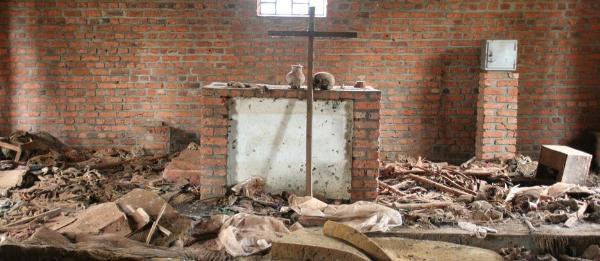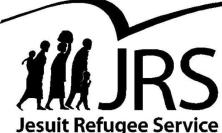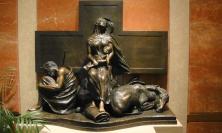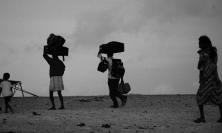On 7th April 2008 it will be fourteen years since the genocide took place in Rwanda and left over 800,000 people dead. At the time, Gilbert Mardai was a Jesuit novice working in a refugee camp near the Rwandan border. Here he remembers that experience and ponders what we have learned – and what we still have not learned – from the atrocity.
In April 1994, I was living a quiet life in Mwanza, Tanzania, not far from the small town of Ngara, waiting to join the Society of Jesus. It was at that time that reports started to reach us of horrendous violence taking place just a matter of a few miles away inside Rwanda. Genocide was on our doorsteps. Little did I guess, that within the year Ngara would be host to a refugee population of between 180,000 and 200,000 and I myself would be living there as a Jesuit novice on placement with the Jesuit Refugee Service, an experience which is still with me, challenging my faith and my commitment to the victims of injustice all round the world. I reached Ngara in January 1995. The sight of the refugee camps was daunting. As we drove into town, its landscape so reminiscent of Rwanda itself, “the land of a thousand hills”, we saw that entire hills and valleys were shrouded in the plastic sheeting of the UNHCR tents provided as shelter for the refugees who by this stage were flocking every day in their thousands seeking sanctuary. Before the genocide, there was no Jesuit presence in Ngara, so we pitched our little tents outside a Catholic church next door to UNHCR headquarters. It gave us a certain feeling of solidarity with the refugees to be without a roof over our heads, even if we did have access to electricity, thanks to the UNHCR generators, and a better food supply. Each day I watched as men, women, and children flooded in on foot and in UNHCR lorries, their faces weary and without hope. The one consolation was that they were out of Rwanda. The majority of the refugee population was Hutu. But there was also a group of people who, as a result of mixed marriages, had Hutu and Tutsi blood. They would have to be accommodated in a separate camp because they stood no chance of surviving in a Hutu camp. The genocide was right there with us!
One day, my superior brought in a nine-year-old boy who was a member of this group. He was alone and had no idea what had happened to his parents. It was to be my duty to take care of him. He moved into my tent. There was one problem: I did not speak Kinyarwanda (his language) and he spoke neither Kiswahili nor English. And so we spent a week together in silence! It was a most extraordinary experience being so close to someone with whom I could not communicate verbally. But I noticed a lot about him: he had developed a high level of attentiveness to his surroundings; he would always stay close to me. At the quietest sound he would turn around glancing to see if he was still safe. There must have been thousands of children like him who would not survive life in the ‘wrong’ camps. And so it was that after a mere week we had become mysteriously close, silent companions in the eye of the storm. But the time had come for him to go to a special camp; I never heard from him again but his face is still etched on to my memory all these years later; I just hope and pray he is somewhere safe, living a life of dignity and security.
That silence we shared has also stayed with me. It was certainly not devoid of communication. Through my presence, I know he learned the difficult lesson of how to trust again. Maybe he even found hope. That at least is what JRS was sent to do in Ngara: to bring hope to those bereft of it. Even the radio station we set up in 1995 emphasised our core mission: Radio Kwizera – which means Radio Hope in Kinyarwanda. What did I find in that silence? That’s harder to express. It has been a constant background to my life since I spent those two months in the camp. It’s an ambiguous silence, I have learned. Perhaps it starts with the much deeper, darker silence which enveloped Rwanda itself, the silence that witnessed the sight of so many people, macheted ruthlessly by their neighbours; the silence that allowed some respite and security to those hiding from the killers and which helped them hear what was going on around them.
But this silence must have been communicating something more. One of those involved with the UN peace-keeping mission in Rwanda was Lt Gen (retired) Roméo Dallaire. Rwanda had been a paradise where God would walk in the cool of the evening. But paradise was to be “assaulted by the devil and the devil did its best to destroy it.” Dallaire was head of an under-funded UN peace-keeping mission in Rwanda, left alone to do whatever was possible under the circumstances to stop the genocide. But under strict instructions not to use force himself, he was obliged to watch as people set about slaughtering one another in cold blood.
He would later tell the story of that horrific time in his book, Shake Hands with the Devil: The Failure of Humanity in Rwanda, and, together with Peter Raymont, he produced a documentary film called Shake Hands with the Devil: The Journey of Roméo Dallaire. In that film, Dallaire recounts the depression he lived through after the trauma of the genocide. “I became so silent” he says, “I couldn’t sleep. I couldn’t stand the loudness of silence.” In a speech he gave to the university students in Butare, Rwanda, in 2004 he confessed, “Gen Dallaire failed the people of Rwanda”, taking the whole responsibility upon himself for the failure of the peace-keeping mission.
Dallaire went too far. I do not believe the failure was entirely his; as a soldier he could only take orders. Rather, it is the rest of humanity which has something to account for. During the 100 days of the Rwandan genocide, the world was silent – the silence of wilful ignorance and maybe even complicity. Years later this silence persisted. This is the deafening silence that Dallaire could not stand, the silence that allowed the devil to carry out his plan of destroying the humanity of Rwanda.
Genocide is still an ever-present threat, fourteen years later. Take Kenya for example: the crisis is not over yet. Look at Chad. And who knows what is awaiting Zimbabwe with the coming elections! The failure of humanity in Rwanda will be repeated if the world’s silence offers no empathy, no compassion.
The inability of cultures, states and international institutions to grasp the meaning of what took place leaves us silent. How could people created in the image and the likeness of God become so inhuman? Was God no longer there? Was God there but silent?
What of God’s silence? Is God to blame in all this? Jesuit philosopher, Gerard J Hughes, points to the fact that Jesus endured deep suffering and distress. His last words are an agonising question: “My God, why have you abandoned me?” Prayers like this are “not prayers in any comfortable sense, nor even were they petitions. Yet Paul insists that the Spirit of God remains with us even in such distress, and is the motivation for all our prayer even when we have no words of our own other than those of abandonment.” (Is God to Blame? The Problem of Evil Revisited, p. 123) It is precisely because Jesus suffered and was not left alone, that we too trust that God has not brought us this far only to forsake us.
In many places in Rwanda during the genocide, people took refuge in churches – it has been the case too in Kenya – and some priests, when they had done all they could for the people and now faced with the killers, sought their final hope and refuge for the people and for themselves in the celebration of Mass. In that “silence so loud”, they heard a whisper of hope: God is present! “That awareness of God in the depth of ourselves,” says Hughes, “is not on the same level as the joys or disasters of human life. It is an awareness of a dimension of our experience which is not in that way ‘practical’ at all … it is to have lived the experience that nothing need separate us from that gift; and to hope that that realisation will be there for us at all times, come what may.” (Op. cit. p. 124)
Indeed with the extreme evil there is, paradoxically, the other excess of pure good. God is present in the form of the hope we continue to have, in the people who give us courage and support, and in the patience we have in waiting for a better future. Humanity may be silent but God will not be silent anymore. As the psalmist says: “he is coming, our God, and will not be silent.” (Ps 50:3) As we remember what happened in Rwanda fourteen years ago we want to “remember not the words of our enemies” as Martin Luther King said, “but the silence of our friends.” For the silence of our friends is a reminder that, even in the midst of the terrifying horrors that come our way, we can still honestly offer ourselves up to God with faith and hope confident that God will never fail us.
I do not blame anyone, because blaming does not heal wounds. Rather, I admit that what happened in Rwanda was a failure of humanity. And just as in Rwanda, what is happening elsewhere in Africa, particularly in Kenya and in Chad, can manifest that failure again in silence.
Gilbert Mardai SJ is a Jesuit priest from Tanzania, currently living and studying in London.
![]() Is God to Blame? by Gerard J Hughes
Is God to Blame? by Gerard J Hughes
![]() Shake Hands with the Devil by Roméo Dallaire
Shake Hands with the Devil by Roméo Dallaire






